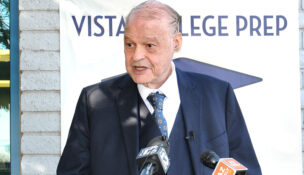Schools and free speech – Officials debate about when discussion turns into influence
Arizona Capitol Reports Staff//July 21, 2006//[read_meter]
Schools and free speech – Officials debate about when discussion turns into influence
Arizona Capitol Reports Staff//July 21, 2006//[read_meter]
An attempt to educate or indoctrinate≠ That was the question raised after a labor leader delivered a controversial speech in April to 800 students in a district the state superintendent...
No tags for this post.

















